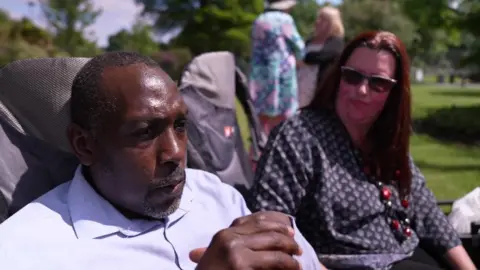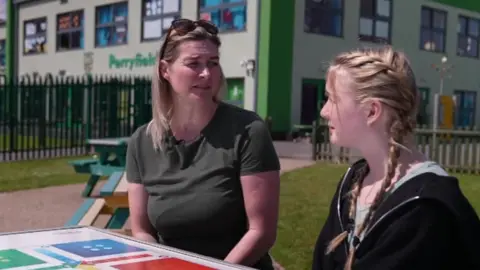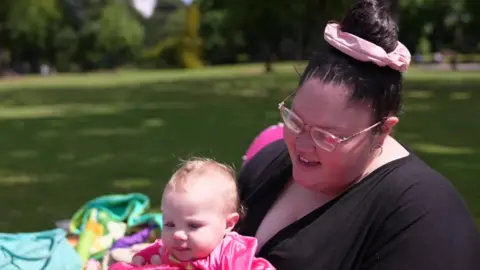Three things we're cutting back on as prices rise
 BBC
BBCPrices are rising for households across the UK and a survey for the BBC suggests people are getting increasingly worried about how they will cope.
Food, fuel and energy bills are rising faster than they have for thirty years, and many people are responding by cutting back.
The BBC talked to people in Birmingham and Kent to find out how they're adapting their day-to-day spending.
1. Food
Paul and Amanda are both in work, and until recently didn't really have to watch what they were spending week to week.
"Now we're doing it on a daily basis," says Paul.
They do still get takeaways and go out for meals, but not as often as they used to. And when they do go out they order a jug of tap water to keep the bill down.
"We never used to do that," says Amanda. "We're just more mindful now, of expenditure."
At the supermarket, instead of buying branded products like they used to, they are looking at own-brand items, and are looking for deals.
"We can't just go in there and buy what we like now, we have to think, 'Well, hold on a minute,'" says Paul.
"We have to look at: What do we really want? What do we really need? Do we really need that luxury? Do we really need those sweets?"
They are also shopping around, and buying in bulk, "just to make sure that if we buy this now, that will last a month or two," says Paul.
Paul and Amanda are not alone in cutting back on food expenditure. The survey for BBC News indicates that about two thirds of people have been eating out less, while more than half are buying fewer takeaway meals.
More than half of the survey respondents had reduced the amount of food they had bought. And more than half said they had skipped meals in the past six months to save money, with one in 10 saying they often did so.
2. Clothes

After the shock of recent rises in her gas, electricity, and food bills, Rebecca says she decided it was time to change tack when it came to the family's shopping habits.
"We're having to make steps, clawing back a bit of money," she says. "We know there's going to be [further] rises in gas and electricity coming in October, so we're just trying to get into good habits now."
Rebecca says she has never been a "big spender" when it comes to fashion, but her daughter Jess does want new things.
"We're having to rein back the amount of money that we're spending on clothes.
"We're having to make sure we're making the most of what we've got, as opposed to going out and buying new," she says.
She was relieved to find the secondary school Jess is due to go to is providing free school uniforms.
Over the past six months, three quarters of people have spent less on clothes for themselves, and almost half have spent less on clothes for their children, the BBC cost of living survey suggests.
3. Going places

Georgia is also budgeting to cope with price rises, and one way she can save money, she says, is by spending a day out at Cannon Hill Park in Birmingham, rather than taking her daughter Harper-Faye to a visitor attraction.
"I haven't got the money to go to Sea Life Centres and stuff. That's like, £25 a ticket," she says.
She is also cutting back on using her car.
"The diesel [price] is absolutely crippling me," she says. "I can't go out as much as I used to, not a chance. I can't afford it.
"I need to make sure I can get to work and back, and that's my priority at the moment."
In fact overall she is not doing as much "fun stuff" as she used to, says Georgia.
 Lisa Steward
Lisa StewardLisa, a disabled powerchair user who lives near Ashford in Kent, is also cutting back on her car use, due to the rise in fuel prices.
"I am having to choose whether I can afford to go out," she says.
"I have a wheelchair accessible vehicle, but obviously, fuel is really expensive, so I'm having to make choices on how often I can afford to go shopping - just to get to the shops, let alone affording the price rises once you get there as well," she says.
"My main concerns are food and energy, so I'm having to cut back in every area of my life, just to be able to afford those two things."
Rising bills have an impact on life, she says. "It's not just a case of: I'll drop a brand. When you're already on the lowest brand because you couldn't afford the more expensive ones, when you were already limiting how much you could go out because of the costs, it's really bad."
Nearly two-thirds of people in the BBC survey said they had gone on fewer days out, and roughly the same proportion said they had cut back on trips taken in the car.
